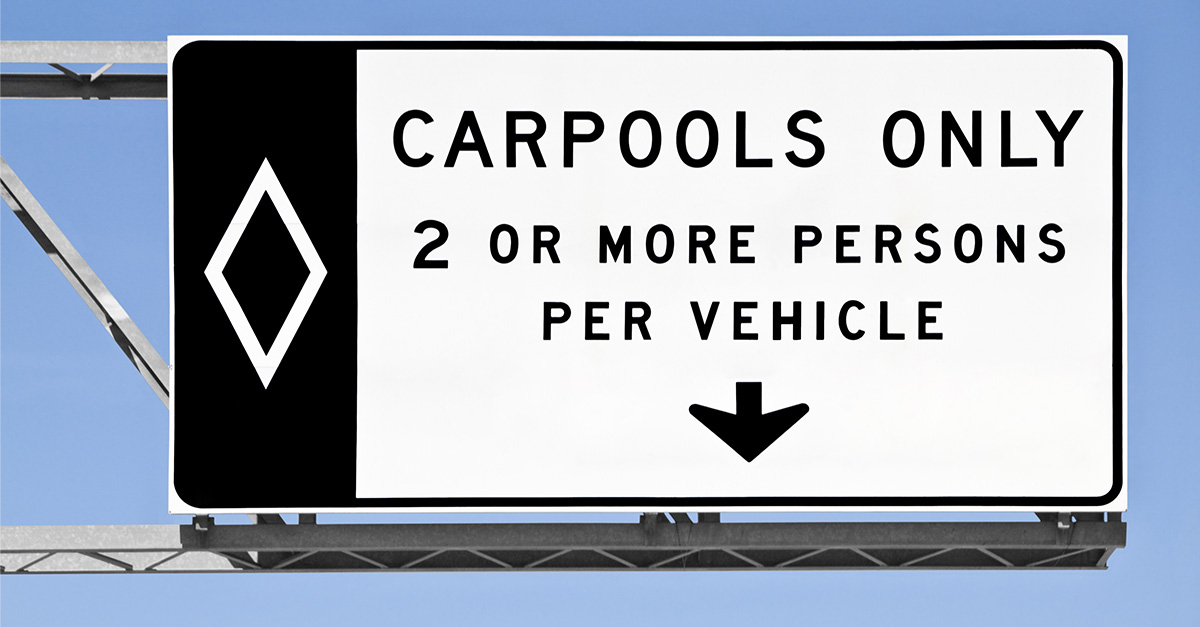


Get a free copy of Parental Rights & Education when you subscribe to our newsletter!

“Certainly, I’m suggesting that there are two lives in the car. I think that an expecting mom and her pre-born child have the right to be in the HOV lane. There are a number of precedents we have on the books related to treating an expecting mother and her child as two people.”
–ARIZONA REP. MATT GRESS
Arizona has followed Texas, Utah, and Virginia, in introducing bills in this year’s legislative sessions that would allow a pregnant woman to drive in the less-crowded high-occupancy vehicle (HOV) lanes, a move that pro-abortion activists fret could put the law on the road to granting “personhood” to unborn children.
If these laws pass, pregnant women will no longer have to join a carpool in order to drive in the HOV lane, which would allow them to bypass traffic congestion, save on some toll-road charges, and arrive at their destination more quickly and with less stress.
Arizona Freshman Rep. Matt Gress, R, introduced HB2417 earlier this week. The bill will allow pregnant women to count their unborn child as a second passenger and legally drive in the HOV lane. Gress explained:
“Certainly, I’m suggesting that there are two lives in the car. I think that an expecting mom and her pre-born child have the right to be in the HOV lane. There are a number of precedents we have on the books related to treating an expecting mother and her child as two people.”
The Lone Star State was the first state to consider this type of legislation. Rep. Briscoe Cain, R, introduced HB521 this past November. It says a pregnant woman operating a motor vehicle “is entitled to use any high occupancy vehicle lane in this state regardless of whether the vehicle is occupied by a passenger other than the operator’s unborn child.”
Cain came up with the idea after Brandy Bottone, a Plano woman then 34 weeks pregnant, was ticketed by a police officer for illegally driving in the HOV lane. She argued that Texas’ new heartbeat law banning abortions after six weeks meant that her unborn child should count as a second passenger in the HOV lane. She wasn’t “trying to make a political stance,” she later told the Dallas Morning News. “But in light of everything that is happening, this is a baby.”
Utah House HB 256 would also allow pregnant women to count their unborn child as a second occupant when driving in the HOV lane. On introducing the bill earlier this month, Rep. Stephanie Gricius, R, described her proposal as “life affirming” and “pro-woman.” On Monday, the House Transportation Committee voted 6-3 to advance the bill and bring it to a full vote before the House.
In Virginia, HB 1894 would amend the state’s HOV law so that “any pregnant woman shall be considered two people for determining occupancy in high-occupancy vehicle lanes and HOT lanes.”
Under the bill, pregnant women would have to notify the Virginia Department of Transportation of their pregnancy status; VDOT would then link the information to her toll collection device. If not in a toll lane and stopped by a police officer, the woman would have to provide proof of her pregnancy. The information collected would not be open to the public or sold and would be purged one year after certification of pregnancy or within 24 hours of being notified that the woman is no longer pregnant.
HB 1894 and the other bills have ignited controversy regarding the idea that the pre-born are “persons.”
Some pro-lifers are celebrating the legislation. Denise Harle, Director of the Center for Life with Alliance Defending Freedom, said,
“While some states are pushing an extreme pro-abortion agenda that aligns with North Korea’s and China’s inhumane laws, other states are actively searching for ways to defend the humanity of the unborn and support pregnant mothers. An unborn baby’s heart beats at just 6 weeks after conception; at 8 weeks, she has fingers and toes; and at 10 weeks, she has her own fingerprints. This Virginia bill recognizes the reality that unborn children are separate, living, unique human beings.”
Pro-abortion advocates, however, claim that this type of legislation is an attempt to grant “personhood” to children in the womb and take away abortion rights. Tarina Keene, executive director of Repro Rising Virginia, said,
“This is an insidious bill, because on its face, of course, most people would like to use the HOV lanes and pay less for using express lanes that have tolls on them, and that is something we might think can appeal to a certain demographic. But when you read it, you do see how insidious this bill really is.”
She added: “What its real intention is here — and they try to do this a lot of different ways, the anti-abortion politicians — is they draft legislation that looks like, on its face, it has good intentions, but it’s really being used to push this idea of personhood,” Keene said. “It’s being used to say life begins at conception. If something like this were to pass… you are really taking away the rights of a pregnant person.”

When you think of insidious, what do you think of? Something evil, manipulative, cold, with ill intent. We would submit to you that it isn’t this type of legislation that is insidious. Allowing pregnant mothers to drive in the HOV lane hardly fits the description; rather, it seems more in line with granting a kindness to women who need to spend as little time stuck in traffic as possible, not unlike the already accepted notion of providing parking spaces so pregnant mothers don’t have to walk as far to their destination.
Clearly, the intent of the legislation is making an argument towards personhood for children in the womb, but is that insidious?
When you think about it, don’t most of us treat babies in the womb as humans already? When you get the call saying your friend or family member is pregnant, do you coldly reply, “Ah yes, a clump of cells”? When you see a pregnant mother shopping for baby items, hand on her stomach, do you think, “That mother sure has a lot of affection for a non-human organism”? When your wife first feels her baby kick and enthusiastically grabs your hand and places it where she felt the baby kick, do you think, “Oh, what a lovely electrical impulse”? As the day draws near, do you believe your due date will be the moment your subhuman fetus will somehow magically morph into a human baby?
No, when you got the call, you rejoiced with your friend who had tried for so long to have a child. When you saw that pregnant mother, you smiled thinking of the beauty of her love for the baby growing in her womb. When your wife grabbed your hand and you felt your child kick for the first time, you were filled with fear and excitement all at once, knowing that soon you would be a father. As you counted the days to the due date, you believed that to be the day you finally got to physically hold your child, the little person you had already spent the last several months getting to know.
The truth is that we all know that the little life inside is a human being, and even if we didn’t, God’s Word lets us know. In Luke 1, God’s Word shows us a look inside the womb. Mary had just been told that she was to give birth to the Christ and was told that even her cousin Elizabeth had conceived a son in her old age — not a clump of cells, a son. Luke 1:41-44 tells us that when Mary went to visit Elizabeth, this happened:
“When Elizabeth heard Mary’s greeting, the baby leaped in her womb; and Elizabeth was filled with the Holy Spirit. And she cried out with a loud voice and said, ‘Blessed are you among women, and blessed is the fruit of your womb! And how has it happened to me, that the mother of my Lord would come to me? For behold, when the sound of your greeting reached my ears, the baby leaped in my womb for joy.’”
There are many important things to consider in this interaction. Elizabeth already recognized Mary as the mother of the Lord, very early in her pregnancy. We know that the angel appeared to Mary when Elizabeth was in her sixth month of pregnancy, meaning when this happened, she was around her 24th week. John the Baptist leapt for joy at the sound of Mary’s voice, responding to her voice and Elizabeth’s filling with the Holy Spirit. Leaping for joy is something a person does, not a clump of cells. There is a key point in these verses in the Greek word Luke employed. Luke, a medical doctor, specifically used brefos, not the term for fetus but the word for baby, the same word he used to talk about Jesus as the newborn babe lying in a manger.
So what’s truly insidious, recognizing the personhood of a human child, or fervently working to convince society that the baby, the one kicking and leaping for joy, the one we all know is a baby, isn’t really a person, denying it legal rights, dehumanizing it, and advocating for the right of a mother to kill her own child?
Matt Gress is right: When a pregnant mother is driving in an HOV lane, there are two lives in that car: hers and her baby’s. America needs more people like him who will bring to the national conscience the moral and legal recognition that babies are people too.
Ready to dive deeper into the intersection of faith and policy? Head over to our Theology of Politics series page where we’ve published several long-form pieces that will help Christians navigate where their faith should direct them on political issues.

Notifications